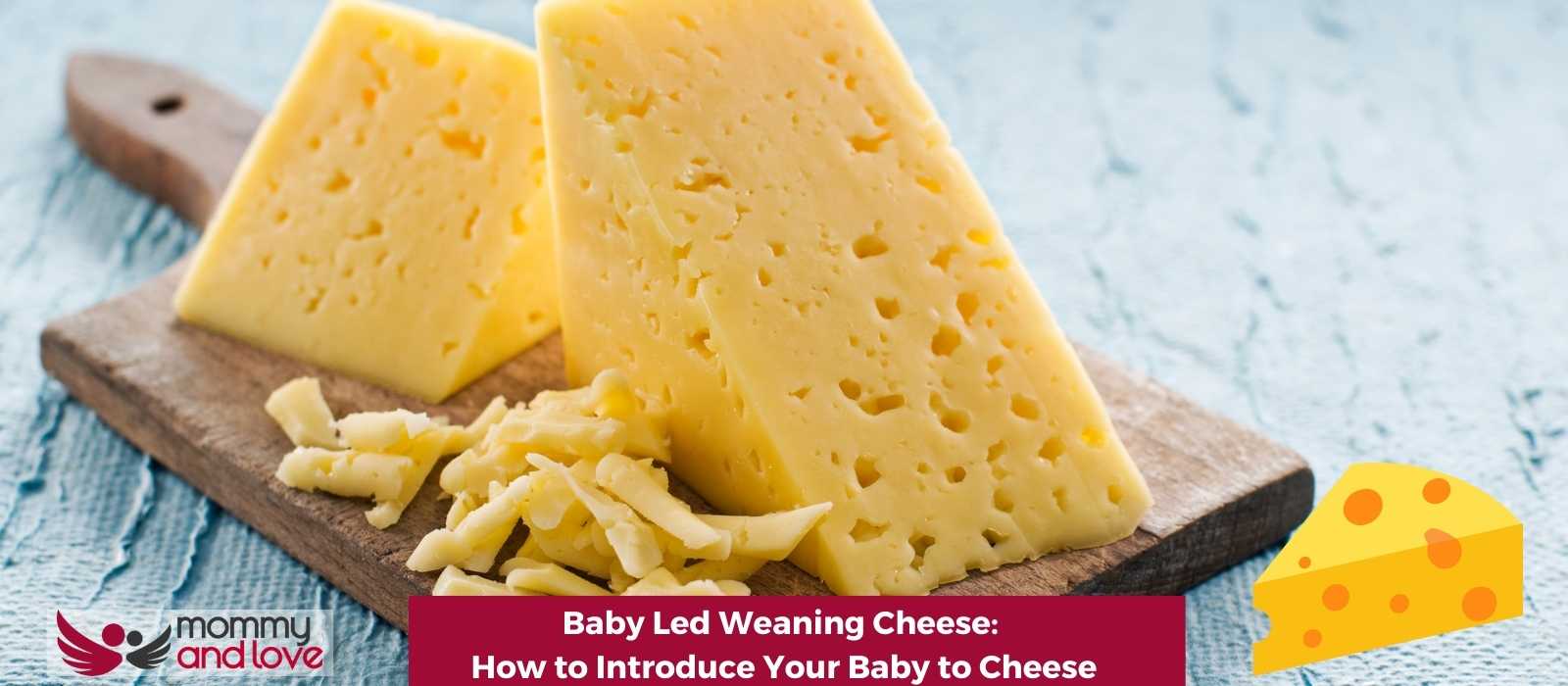Introducing your baby to cheese is a fun and delicious way to help them start their journey of baby-led weaning. There are many different types of cheese that you can use for baby-led weaning, so it’s important to find the right one for your baby. In this guide, we will discuss the different types of cheese that are perfect for baby-led weaning, as well as how to introduce them. Keep reading to know more!
Is Cheese Good for Babies?

Cheese is a great first food for babies!
As long as your baby has started solids, you can offer cheese as one of his first foods! Make sure to check with your pediatrician before introducing any new foods to your baby.
Cheese is packed with calcium and protein and comes in many varieties, so there are plenty of options to choose from. And you can offer cheese in its simplest form: no recipes or cooking required.
Can Babies Eat Cheese?
Yes, babies can eat cheese!
Cheese is a great food for baby-led weaning because it’s easy to chew and digest. It also contains important nutrients like calcium and protein. Just be sure to choose the right type of cheese for your baby and follow the guidelines below on how to introduce it.
When Can Babies Have Cheese?
Babies can eat the right kind of cheese as soon as they are ready to start eating solid foods. This is usually around 6 months old, but it can vary depending on their development.
Is Cheese a Common Choking Hazard for Babies?
Cheese is one of the most common choking hazards for babies. Serving cheese in large chunks can be difficult to get down, and even if your baby manages to swallow them, they can cause irritation and inflammation in the esophagus. To prevent choking, cut cheese into small, bite-size pieces.
Can Babies Be Allergic to Cheese?
Yes, babies can be allergic to cheese especially cheeses made from cow’s milk. Dairy allergies are one of the most common food allergies in children.
Why are babies allergic to cheese?
The reaction that produces the allergy is a response to a type of protein called casein, which is found in most animal dairy foods. Because caseins and whey proteins are found in all milk-based foods, including cheese, your infant may have an allergic reaction to any milk product.
What are the symptoms of a milk allergy?

Most children who have an allergy to milk experience mild symptoms such as vomiting, diarrhea, or bloating.
Other symptoms include eczema and hives. In severe cases – which are rare – children may develop anaphylaxis and go into shock.
Should I take my baby to see the doctor if he has a mild allergic reaction after eating dairy products?
If your baby has milk allergies and seems uncomfortable when eating a dairy product or experiences mild symptoms such as hives or swollen eyes, stop feeding him the product. If the symptoms persist for more than a few hours or become more severe, contact your pediatrician immediately. Many children outgrow being lactose intolerant and their dairy allergies by age 2 or 3 years old.
How Much Cheese Can Babies and Toddlers Eat?
If there is no family history of dairy allergy or lactose intolerance in the family, try introducing cheese when your baby is 7 months old. Start with small amounts of shredded cheese (about 1 ounce), just once per day at first.
After you’ve offered it for 4 days in a row with no reaction, give it twice a day for 4 days in a row before moving on to another new food. Once you’re sure that your baby can eat cheese without problems, give it twice a day along with other foods.
When your baby is 8 to 12 months old, give him or her pieces of soft mild cheeses, like mozzarella sticks or cubes of Cheddar or Monterey Jack. This will help your child learn how to chew and swallow thicker foods.
By the time babies are 9 to 12 months old, they can usually handle yogurt and cottage cheese — just be sure to choose varieties without any added sugar. You can offer these foods as often as you’d like, but limit whole milk yogurt to once a day due to its saturated fat content.
Cheese is an important source of calcium (for healthy bones) and healthy fats in kids’ diets. The amount they need depends on their age:
- 1-3 years: 2 servings a day
- 4-8 years: 3 servings a day
How to Prepare Cheese for Your Baby?
There are a few different types of cheeses you can try and several preparation methods that make it easy.
- Choose the right type of cheese: Babies can eat hard cheeses like cheddar and Swiss, as well as soft cheeses like cream cheese, goat cheese, mozzarella, swiss cheese (Emmental cheese) and brie. Avoid blue cheese, Camembert, Roquefort, and other strong-flavored types. Also, choose pasteurized cheeses (which are made from pasteurized milk) and avoid if they are made from raw milk.
- Serve cheese in small pieces to prevent choking: Choking is a risk with any food, but it’s especially important to watch for with cheese since it’s a common choking hazard. Cut and serve the cheese into small cubes or shreds before giving it to your baby.
- Try different preparation methods: You can offer cheese plain or try adding it to other foods. For example, you can introduce cheese by adding grated cheese on top of pasta dishes. Mixing it with healthy food such as fruit or vegetable purees and scrambled eggs is a good way to introduce new flavors. You can also try grating cheese over the baby’s food or adding it to the baby’s cereal.
- Avoid processed cheeses: Processed cheeses like American cheese and Velveeta are made with artificial ingredients and fillers that can be hard for your baby to digest. Stick to natural cheeses instead. Avoid unpasteurized cheese as well.
If you have any concerns about feeding cheese to your baby, talk to your pediatrician. introducing new foods to your baby, especially if they have a history of allergies. With a little care and preparation, you can safely add cheese to your baby’s diet.
How to Incorporate More Cheese Into Your Child’s Diet?
Cheese is an excellent source of protein, vitamins and minerals for your growing child. It offers more calcium than milk and has no sugar (which milk does). Cheese can be a healthy part of your child’s diet if incorporated in the right way even if she is still getting most of her nutrition from breast milk.
Incorporating cheese into your child’s diet can be done in a number of ways. The most common is as a snack, but don’t limit yourself to just that. Cheese can also be used as a healthy alternative for dessert and even added to meals as an extra source of protein. The key is how much and what type of cheese you use.
Additional Information
Here is a few information that you need to know about giving cheese for baby-led weaning:
Do Babies Need to Eat Organic Cheese?
No, they don’t! As long as you’re feeding your baby safe food that is appropriate for his or her age and stage, the “organic” label on the packaging doesn’t make one bit of difference.
Can Babies Eat Vegan Cheese?
While there are many vegan cheeses available in the market, most of them aren’t suitable for babies. As with any other food, vegan cheese can be added to your toddler’s diet after 12 months of age. However, make sure that the cheese doesn’t contain nuts or soy. If you are unsure about the ingredients in a particular brand, it is better to consult your doctor before offering it to your baby.
What Kind of Cheese Can My Baby Eat?
Cheese for baby-led weaning is easy for babies to digest and can be served in many ways. Offer small pieces of soft cheeses, such as cheddar, American or mozzarella. You can also serve cottage cheese or ricotta mixed with fruit or vegetables. Many cheeses are made from grass-fed cows milk so when buying cheese products, look for real cheese or plain cheeses without added sugar or salt. Babies don’t need extra sodium.
Which Cheeses Have the Highest Sodium Content?
Obviously, cheese is high in sodium. But some cheeses have more than others. String cheese might sound like a good idea for finger foods but it might contain high levels of sodium.
Cheese can have as much as 210 milligrams of sodium in one slice (which is considered one serving). That’s not unusual. But there are also cheeses that can provide a lot more sodium per serving.
Here are the cheeses with the highest sodium content:
- Shredded four-cheese pizza cheese blend (210 mg)
- Parmesan cheese (220 mg)
- Cheddar cheese (170 mg)
- American cheese (260 mg)
- Mozzarella cheese (170 mg)
How Can Cheese Affect Baby’s Poop?
The relationship between cheese and poop is a bit surprising in the first place. Cheese is not a vegetable, so it can’t be expected to produce the same kind of gut flora as its greener relatives.
So why does cheese cause babies to have smelly poops? The answer lies in a protein called casein. Most of the protein in milk exists in the form of casein. This protein is broken down into amino acids during digestion, but some casein molecules remain intact. These undigested molecules can pass through the gut barrier and into the bloodstream, where they are carried to the kidneys and excreted.
It’s important for us to understand that not all proteins are created equally. The properties of different proteins determine how much energy we get from them, how much waste they produce, and how quickly we digest them.
Takeaway
Introduce cheese for baby-led weaning at age 6 months when your baby is ready for solids. Choose and serve cheese of the right kind to add to baby food. Milder tasting cheese, pasteurised full-fat cheese, shredded mozzarella or fresh mozzarella, cream cheese, grilled cheese sandwich with a bit of bacon and grated cheese with low sodium content are recommended.
Cheese for baby-led weaning is a great food to introduce your baby to. It’s packed with calcium and protein, both of which are important for growing babies. However, cheese should be served in moderation as it does contain a lot of fat and salt. Also, make sure your baby doesn’t have a dairy intolerance. If you want to start introducing cheese to your baby, we have some tips on how to do so safely and healthily.

This article was written by Sandra Baker – full time writer and the mother of four amazing kids (including twins!)
She’s also a breastfeeding counselor and has spent years helping new parents learn how to care for their children. When she’s not writing or caring for her children, Sandra likes to spend time reading and taking walks with her husband.




